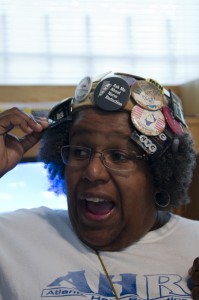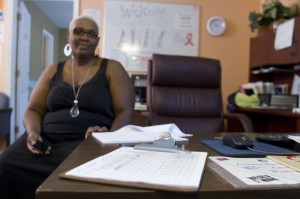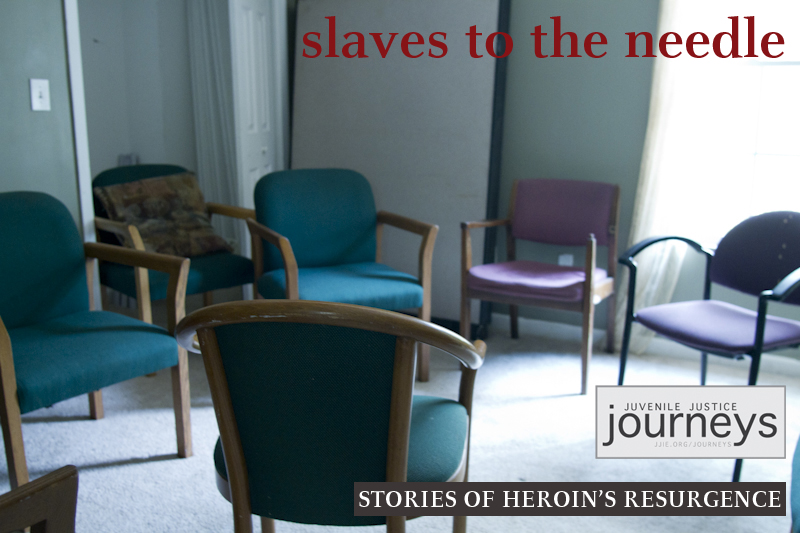
Mona Bennett. Photo by Clay Duda
["Making Peace with the Dragon on One Atlanta Streetcorner" is the final part of a three part series on heroin addiction. Check out this page for parts one and two.]
Mona Bennett never leaves the house without her Braves baseball hat. The cap itself is hidden beneath dozens of buttons of all shapes and sizes pinned to every available surface with messages from “Rock the Vote” to “This place really cooks!” But Bennett is most proud of a series of buttons from the Atlanta Harm Reduction Center (AHRC) where Bennett is the program director. The buttons and the hat always draw curious stares and questions. And Bennett is always happy to answer.
Harm reduction is a public health strategy — a way of thinking, Bennett calls it — that helps people protect themselves from the dangers of illegal drug use, unprotected sex and prostitution. “It’s about making sure people know the risks of using drugs and how to reduce those risks,” Bennett said.
At AHRC, reducing risk takes a variety of forms, among them a hypodermic needle exchange, HIV and tuberculosis testing and condom distribution (Bennett's hat is pinned with condoms, as well).
The Atlanta Harm Reduction Center is located in an area of southwest Atlanta known as the Bluffs, one of the city’s most poverty- and crime-ridden neighborhoods. From the street, AHRC looks like a well-maintained residential, two-story duplex in a neighborhood filled with small homes and cracked, weed choked sidewalks. A paved driveway gives way to a dirt parking lot filled with a few cars and a large, white passenger van, all parked at odd angles without thought to creating orderly rows. Inside, AHRC is a mish-mash of donated and second-hand office furniture. The walls are covered with colorful posters and artwork promoting safe sex or HIV testing. One wall is painted with the message, “Safety counts! Wrap it before you tap it.” Educational pamphlets are everywhere — hanging in bins on the wall, lining every flat surface and in the hands of volunteers.
Just inside the main office door is a kitchen where volunteers prepare meals for everyone who attends group sessions at the house. Beyond that is a room filled with desktop computers that are available to anyone who needs Internet access. Another has telephones. At the far end of the house is a living room lined with soft sofas.
“Those towels behind you: we offer showers,” Bennett said as she showed us around the house.

An AHRC volunteer sitting in front of the sign-in clipboard. Photo by Clay Duda
Volunteers are at every turn signing visitors in, talking with them, giving them cold, bottled water or donuts and pastries. Moving on through the house, past the woman wearing a Run-DMC t-shirt and beyond an oversized, orange cooler, are stairs leading to the second floor.
“Monday was HIV testing day,” Bennett said, reaching the top of the stairs. “Sixty-seven people now know their HIV status.”
Upstairs, AHRC holds group sessions or watches movies. Visitors can also “shop” from a room packed with donated clothing.
“At least half of the people we deal with are homeless,” Bennett said. “People have a lot of needs.”
All of these services fall under the harm reduction label, but AHRC is most known for being the only hypodermic needle exchange in Georgia. Two days a week, the AHRC team conducts “street outreach.” They load the oversized, white van parked out front with new, clean needles and drive a few blocks away where they set up shop on a corner and meet with intravenous drug users. There, the staff hand out clean needles, accept used, dirty needles for proper disposal and provide information on safer intravenous drug use. In its 17-year existence, AHRC has conducted more than 750,000 needle exchanges.
